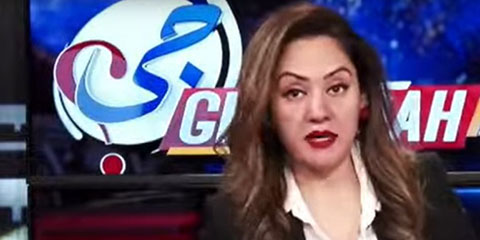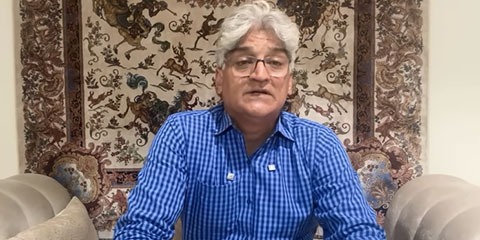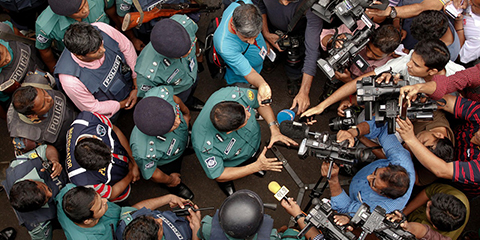HRCP urges complete repeal of PECA, citing threats to free speech and civil liberties
JournalismPakistan.com | Published 6 months ago | JP Staff Report
Join our WhatsApp channel
ISLAMABAD - The Human Rights Commission of Pakistan (HRCP) has called for the complete repeal of the Prevention of Electronic Crimes Act (PECA), rejecting any coercive provisions from both its 2016 and 2023 iterations.
In a newly released report, HRCP highlighted fundamental flaws in the law. The report, compiled by the Commission’s Legislation Watch Cell, was presented by digital rights activist Farieha Aziz, who also authored the document.
Ms. Aziz pointed out that PECA criminalizes ambiguous categories of ‘fake and false information’, punishable by up to three years in prison. She raised concerns about the law's creation of a regulatory authority, complaints council, and tribunal—all heavily influenced by the executive, risking unchecked governmental control.
Additional issues include the reclassification of previously bailable and non-cognizable offenses as non-bailable and cognizable, thus expanding the state’s powers to act coercively. The replacement of the Federal Investigation Agency with the National Cyber Crime Investigation Agency, without adequate safeguards, was also highlighted.
Journalist Adnan Rehmat emphasized that protecting individual rights is the state’s duty and called for the decriminalization of free speech. He proposed inclusive engagement with political parties.
Journalist Saleem Shahid condemned the PECA (Amendment) Act for infringing upon constitutional rights to free speech and access to information. He urged unity among journalists and civil society to defend these freedoms.
Former BNP-M legislator Sanaullah Baloch stressed that freedom of expression is fundamental to a strong parliamentary system.
HRCP co-chair Munizae Jahangir drew attention to the overregulation of digital connectivity in Balochistan and Gilgit-Baltistan and the severe pressure journalists face there and in Azad Jammu and Kashmir. She cited the example of journalist Asad Ali Toor, who revealed that his family’s bank accounts had been frozen due to his journalistic work—a practice she described as “economic terrorism.”
Digital rights activists Usama Khilji and Aftab Alam called for the creation of a national coalition of journalists, civil society, and human rights defenders to advocate for free expression. Supporting this initiative, HRCP Council member Farhatullah Babar stressed the importance of countering disinformation while preserving the right to free speech and information.
ایچ آر سی پی کا پی ای سی اے کے مکمل خاتمے کا مطالبہ، آزادی اظہار اور شہری آزادیوں کے لیے خطرہ قرار
اسلام آباد: انسانی حقوق کمیشن پاکستان (ایچ آر سی پی) نے الیکٹرانک جرائم کی روک تھام کے قانون (پی ای سی اے) کو مکمل طور پر ختم کرنے کا مطالبہ کرتے ہوئے اس کے 2016 اور 2023 کے ورژن میں شامل کسی بھی جابرانہ شق کو مسترد کر دیا ہے۔
ایچ آر سی پی کی قانون سازی واچ سیل کی جانب سے تیار کردہ رپورٹ میں اس قانون کی بنیادی خامیوں کی نشاندہی کی گئی ہے۔ یہ رپورٹ ڈیجیٹل حقوق کی کارکن فریحہ عزیز نے پیش کی، جو اس کی مصنفہ بھی ہیں۔
فریحہ عزیز نے نشاندہی کی کہ پی ای سی اے مبہم اقسام کی 'جعلی اور جھوٹی معلومات' کو جرم قرار دیتا ہے، جس کی سزا تین سال تک قید ہے۔ انہوں نے اس قانون کے تحت ایک ریگولیٹری اتھارٹی، شکایات کونسل، اور ٹربیونل کے قیام پر بھی تشویش ظاہر کی، جنہیں غیر متناسب طور پر ایگزیکٹو کے کنٹرول میں رکھا گیا ہے۔
مزید خدشات میں وہ دفعات شامل ہیں جن کے تحت پہلے قابل ضمانت اور ناقابل گرفتاری جرائم کو ناقابل ضمانت اور قابل گرفتاری بنا دیا گیا ہے، جو ریاستی جبر کی راہیں کھولتا ہے۔ رپورٹ میں بتایا گیا کہ فیڈرل انویسٹی گیشن ایجنسی (ایف آئی اے) کی جگہ نیشنل سائبر کرائم انویسٹی گیشن ایجنسی نے لے لی ہے جو مناسب حفاظتی اقدامات کے بغیر کام کر رہی ہے۔
صحافی عدنان رحمت نے زور دیا کہ ریاست کی ذمہ داری ہے کہ وہ شہریوں کے حقوق کی حفاظت کرے اور اظہار رائے کو جرم نہ بنائے۔ انہوں نے سیاسی جماعتوں کے ساتھ جامع نمائندگی کے ذریعے رابطے کی تجویز دی۔
صحافی سلیم شاہد نے پی ای سی اے (ترمیمی) ایکٹ کو آزادی اظہار اور معلومات تک رسائی جیسے آئینی حقوق کی خلاف ورزی قرار دیا اور صحافیوں و سول سوسائٹی سے اپیل کی کہ وہ ان آزادیوں کے دفاع کے لیے متحد ہوں۔
بلوچستان نیشنل پارٹی (مینگل) کے سابق رکنِ اسمبلی ثناءاللہ بلوچ نے آزادی اظہار کو ایک مضبوط پارلیمان کے لیے لازمی قرار دیا۔
ایچ آر سی پی کی شریک چیئر منیزے جہانگیر نے بلوچستان، گلگت بلتستان اور آزاد جموں و کشمیر میں انٹرنیٹ کنیکٹیویٹی پر غیر معمولی کنٹرول اور صحافیوں پر دباؤ کی نشاندہی کی۔ اس تناظر میں، صحافی اسد علی طور نے بتایا کہ ان کے اہل خانہ کے بینک اکاؤنٹس منجمد کر دیے گئے، مبینہ طور پر ان کے صحافتی کام کی وجہ سے—جسے منیزے جہانگیر نے ‘معاشی دہشتگردی’ قرار دیا۔
ڈیجیٹل حقوق کے کارکنان اسامہ خلجی اور آفتاب عالم نے تجویز دی کہ صحافیوں، سول سوسائٹی اور انسانی حقوق کے کارکنوں پر مشتمل ایک قومی اتحاد بنایا جائے تاکہ آزادی اظہار پر بڑھتی ہوئی پابندیوں کے خلاف سیاسی جماعتوں کے ساتھ مؤثر طور پر بات چیت کی جا سکے۔ ایچ آر سی پی کی کونسل کے رکن فرحت اللہ بابر نے اس تجویز کی حمایت کی اور زور دیا کہ غلط معلومات کے خلاف اقدامات کیے جائیں لیکن آزادی اظہار اور معلومات کے حق کا تحفظ بھی ضروری ہے۔

























